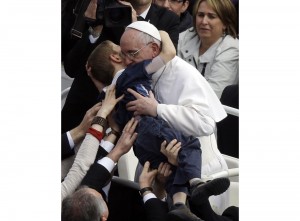Counter a Culture of Waste with Solidarity
 Dear Brothers and Sisters, good morning!
Dear Brothers and Sisters, good morning!
Today I want to focus on the issue of the environment, which I have already spoken of on several occasions. Today we also mark World Environment Day, sponsored by the United Nations, which sends a strong reminder of the need to eliminate the waste and disposal of food.
When we talk about the environment, about creation, my thoughts turn to the first pages of the Bible, the Book of Genesis, which states that God placed man and woman on earth to cultivate and care for it (cf. 2:15). And the question comes to my mind: What does cultivating and caring for the earth mean? Are we truly cultivating and caring for creation? Or are we exploiting and neglecting it? The verb “to cultivate” reminds me of the care that the farmer has for his land so that it bear fruit, and it is shared: how much attention, passion and dedication! Cultivating and caring for creation is God’s indication given to each one of us not only at the beginning of history; it is part of His project; it means nurturing the world with responsibility and transforming it into a garden, a habitable place for everyone. Benedict XVI recalled several times that this task entrusted to us by God the Creator requires us to grasp the rhythm and logic of creation. But we are often driven by pride of domination, of possessions, manipulation, of exploitation; we do not “care” for it, we do not respect it, we do not consider it as a free gift that we must care for. We are losing the attitude of wonder, contemplation, listening to creation; thus we are no longer able to read what Benedict XVI calls “the rhythm of the love story of God and man.” Why does this happen? Why do we think and live in a horizontal manner, we have moved away from God, we no longer read His signs.
This “culture of waste” tends to become the common mentality that infects everyone. Human life, the person is no longer perceived as a primary value to be respected and protected, especially if poor or disabled, if not yet useful – such as the unborn child – or no longer needed – such as the elderly. This culture of waste has made us insensitive even to the waste and disposal of food, which is even more despicable when all over the world, unfortunately, many individuals and families are suffering from hunger and malnutrition. Once our grandparents were very careful not to throw away any leftover food. Consumerism has led us to become used to an excess and daily waste of food, to which, at times, we are no longer able to give a just value, which goes well beyond mere economic parameters. We should all remember, however, that throwing food away is like stealing from the tables of the the poor, the hungry! I encourage everyone to reflect on the problem of thrown away and wasted food to identify ways and means that, by seriously addressing this issue, are a vehicle of solidarity and sharing with the needy.
A few days ago, on the Feast of Corpus Christi, we read the story of the miracle of the loaves: Jesus feeds the crowd with five loaves and two fishes. And the conclusion of the piece is important: ” They all ate and were satisfied. And when the leftover fragments were picked up, they filled twelve wicker baskets” (Lk 9:17). Jesus asks his disciples not to throw anything away: no waste! There is this fact of twelve baskets: Why twelve? What does this mean? Twelve is the number of the tribes of Israel, which symbolically represent all people. And this tells us that when food is shared in a fair way, with solidarity, when no one is deprived, every community can meet the needs of the poorest. Human ecology and environmental ecology walk together.
So I would like us all to make a serious commitment to respect and protect creation, to be attentive to every person, to counter the culture of waste and disposable, to promote a culture of solidarity and of encounter. Thank you.
Text from page http://en.radiovaticana.va/news/2013/06/05/pope_at_audience:_counter_a_culture_of_waste_with_solidarity/en1-698604
of the Vatican Radio website

